Analyzing International Business Expansion Strategies and Imperatives
VerifiedAdded on 2019/12/03
|12
|4020
|223
Report
AI Summary
This report delves into the multifaceted aspects of international business expansion, examining the strategic and environmental imperatives that drive companies to venture into global markets. It begins by outlining the key reasons for international expansion, emphasizing the importance of globalization and the pursuit of market leadership. The report then explores the strategic considerations, such as limited domestic market scope, access to raw materials and human resources, competitive pressures, and the desire to increase sales and profitability. Furthermore, it analyzes the environmental factors that influence international expansion, including political, economic, social, technological, legal, and cultural forces. The report highlights how businesses can leverage these factors to achieve growth, diversify risks, and gain a competitive edge. The report further discusses various market entry strategies and the importance of understanding the target market's culture and needs. Overall, the report provides a comprehensive overview of the motivations, strategies, and environmental influences shaping international business expansion, emphasizing the need for businesses to adapt and innovate in an increasingly interconnected global landscape.
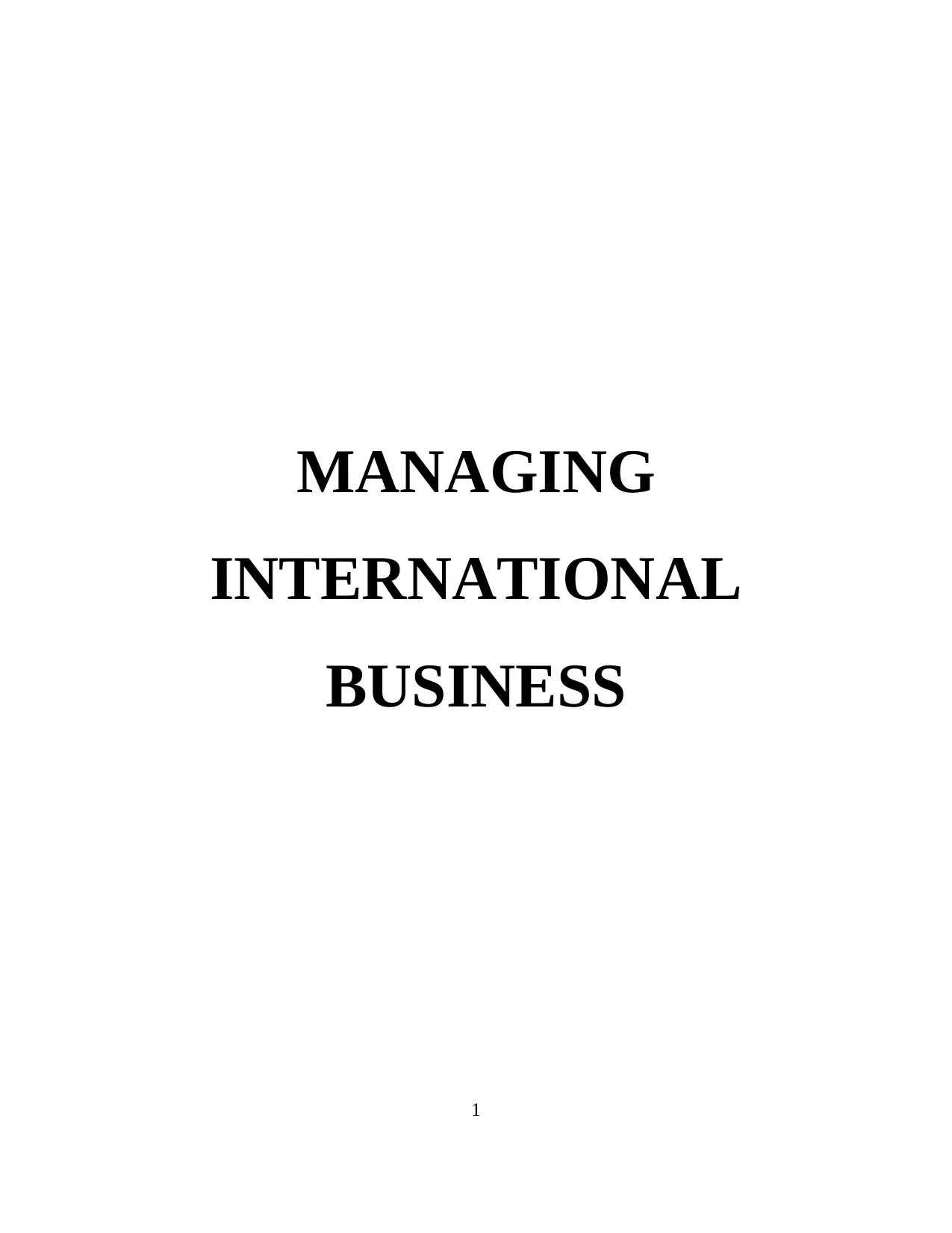
MANAGING
INTERNATIONAL
BUSINESS
1
INTERNATIONAL
BUSINESS
1
Paraphrase This Document
Need a fresh take? Get an instant paraphrase of this document with our AI Paraphraser
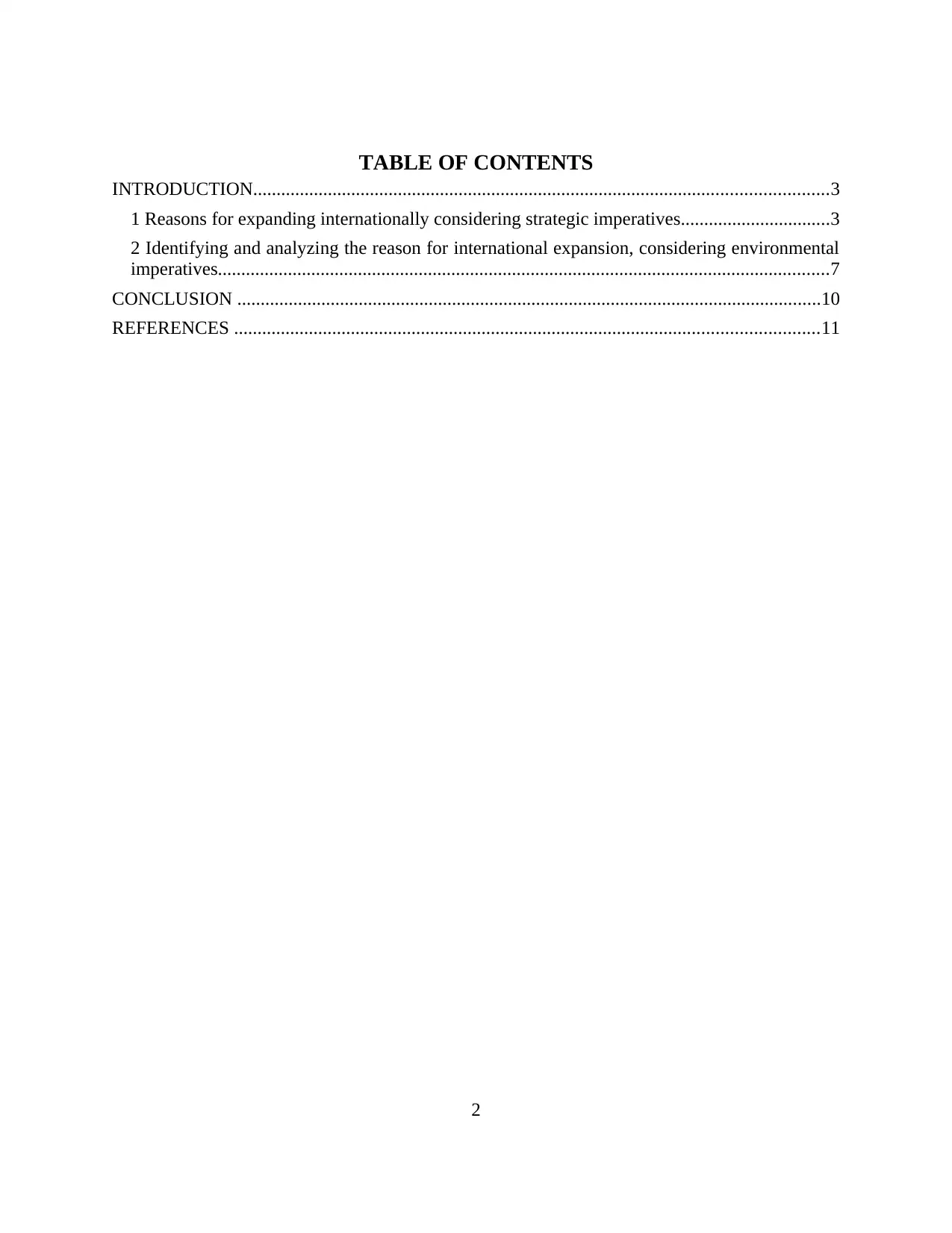
TABLE OF CONTENTS
INTRODUCTION...........................................................................................................................3
1 Reasons for expanding internationally considering strategic imperatives................................3
2 Identifying and analyzing the reason for international expansion, considering environmental
imperatives...................................................................................................................................7
CONCLUSION .............................................................................................................................10
REFERENCES .............................................................................................................................11
2
INTRODUCTION...........................................................................................................................3
1 Reasons for expanding internationally considering strategic imperatives................................3
2 Identifying and analyzing the reason for international expansion, considering environmental
imperatives...................................................................................................................................7
CONCLUSION .............................................................................................................................10
REFERENCES .............................................................................................................................11
2
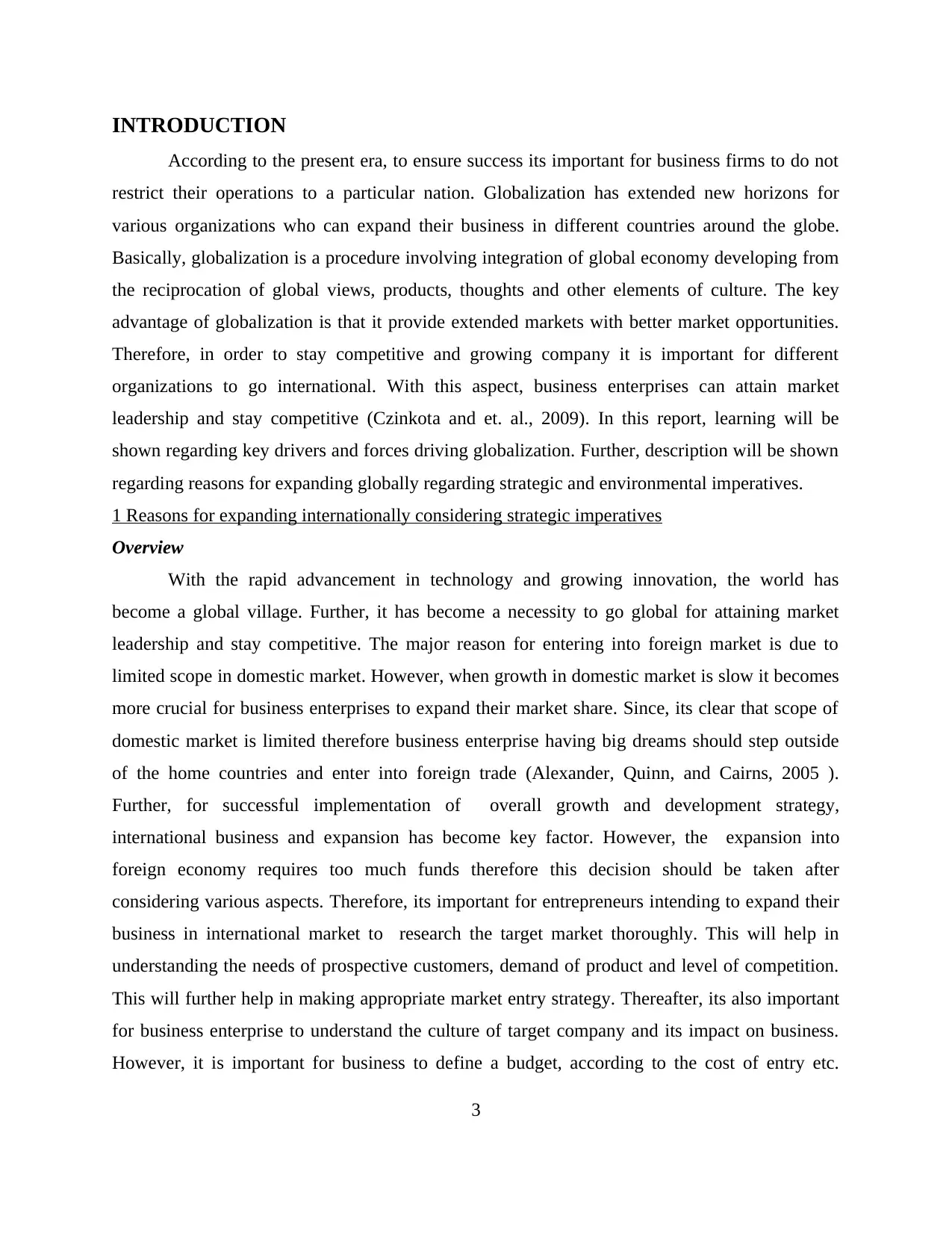
INTRODUCTION
According to the present era, to ensure success its important for business firms to do not
restrict their operations to a particular nation. Globalization has extended new horizons for
various organizations who can expand their business in different countries around the globe.
Basically, globalization is a procedure involving integration of global economy developing from
the reciprocation of global views, products, thoughts and other elements of culture. The key
advantage of globalization is that it provide extended markets with better market opportunities.
Therefore, in order to stay competitive and growing company it is important for different
organizations to go international. With this aspect, business enterprises can attain market
leadership and stay competitive (Czinkota and et. al., 2009). In this report, learning will be
shown regarding key drivers and forces driving globalization. Further, description will be shown
regarding reasons for expanding globally regarding strategic and environmental imperatives.
1 Reasons for expanding internationally considering strategic imperatives
Overview
With the rapid advancement in technology and growing innovation, the world has
become a global village. Further, it has become a necessity to go global for attaining market
leadership and stay competitive. The major reason for entering into foreign market is due to
limited scope in domestic market. However, when growth in domestic market is slow it becomes
more crucial for business enterprises to expand their market share. Since, its clear that scope of
domestic market is limited therefore business enterprise having big dreams should step outside
of the home countries and enter into foreign trade (Alexander, Quinn, and Cairns, 2005 ).
Further, for successful implementation of overall growth and development strategy,
international business and expansion has become key factor. However, the expansion into
foreign economy requires too much funds therefore this decision should be taken after
considering various aspects. Therefore, its important for entrepreneurs intending to expand their
business in international market to research the target market thoroughly. This will help in
understanding the needs of prospective customers, demand of product and level of competition.
This will further help in making appropriate market entry strategy. Thereafter, its also important
for business enterprise to understand the culture of target company and its impact on business.
However, it is important for business to define a budget, according to the cost of entry etc.
3
According to the present era, to ensure success its important for business firms to do not
restrict their operations to a particular nation. Globalization has extended new horizons for
various organizations who can expand their business in different countries around the globe.
Basically, globalization is a procedure involving integration of global economy developing from
the reciprocation of global views, products, thoughts and other elements of culture. The key
advantage of globalization is that it provide extended markets with better market opportunities.
Therefore, in order to stay competitive and growing company it is important for different
organizations to go international. With this aspect, business enterprises can attain market
leadership and stay competitive (Czinkota and et. al., 2009). In this report, learning will be
shown regarding key drivers and forces driving globalization. Further, description will be shown
regarding reasons for expanding globally regarding strategic and environmental imperatives.
1 Reasons for expanding internationally considering strategic imperatives
Overview
With the rapid advancement in technology and growing innovation, the world has
become a global village. Further, it has become a necessity to go global for attaining market
leadership and stay competitive. The major reason for entering into foreign market is due to
limited scope in domestic market. However, when growth in domestic market is slow it becomes
more crucial for business enterprises to expand their market share. Since, its clear that scope of
domestic market is limited therefore business enterprise having big dreams should step outside
of the home countries and enter into foreign trade (Alexander, Quinn, and Cairns, 2005 ).
Further, for successful implementation of overall growth and development strategy,
international business and expansion has become key factor. However, the expansion into
foreign economy requires too much funds therefore this decision should be taken after
considering various aspects. Therefore, its important for entrepreneurs intending to expand their
business in international market to research the target market thoroughly. This will help in
understanding the needs of prospective customers, demand of product and level of competition.
This will further help in making appropriate market entry strategy. Thereafter, its also important
for business enterprise to understand the culture of target company and its impact on business.
However, it is important for business to define a budget, according to the cost of entry etc.
3
⊘ This is a preview!⊘
Do you want full access?
Subscribe today to unlock all pages.

Trusted by 1+ million students worldwide
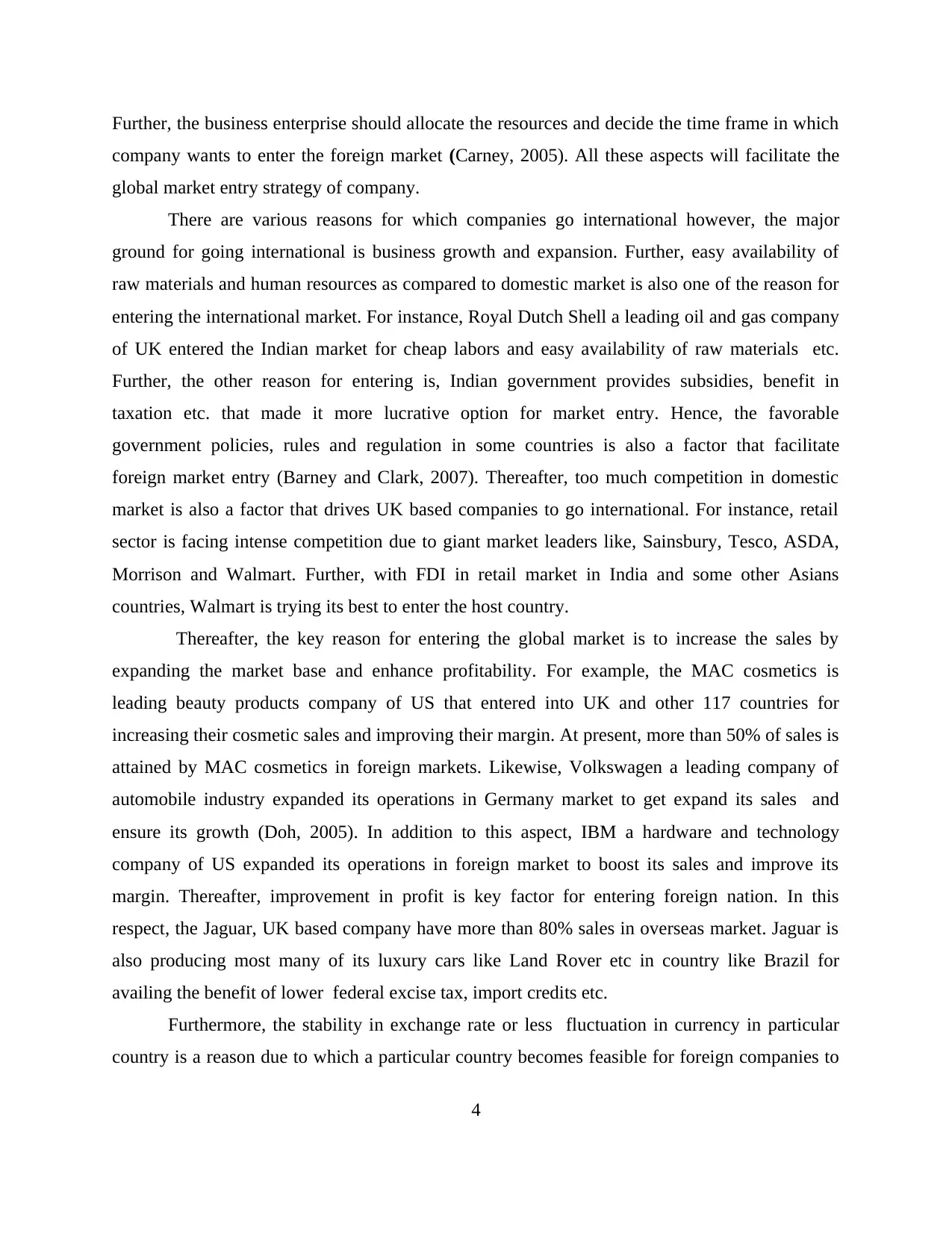
Further, the business enterprise should allocate the resources and decide the time frame in which
company wants to enter the foreign market (Carney, 2005). All these aspects will facilitate the
global market entry strategy of company.
There are various reasons for which companies go international however, the major
ground for going international is business growth and expansion. Further, easy availability of
raw materials and human resources as compared to domestic market is also one of the reason for
entering the international market. For instance, Royal Dutch Shell a leading oil and gas company
of UK entered the Indian market for cheap labors and easy availability of raw materials etc.
Further, the other reason for entering is, Indian government provides subsidies, benefit in
taxation etc. that made it more lucrative option for market entry. Hence, the favorable
government policies, rules and regulation in some countries is also a factor that facilitate
foreign market entry (Barney and Clark, 2007). Thereafter, too much competition in domestic
market is also a factor that drives UK based companies to go international. For instance, retail
sector is facing intense competition due to giant market leaders like, Sainsbury, Tesco, ASDA,
Morrison and Walmart. Further, with FDI in retail market in India and some other Asians
countries, Walmart is trying its best to enter the host country.
Thereafter, the key reason for entering the global market is to increase the sales by
expanding the market base and enhance profitability. For example, the MAC cosmetics is
leading beauty products company of US that entered into UK and other 117 countries for
increasing their cosmetic sales and improving their margin. At present, more than 50% of sales is
attained by MAC cosmetics in foreign markets. Likewise, Volkswagen a leading company of
automobile industry expanded its operations in Germany market to get expand its sales and
ensure its growth (Doh, 2005). In addition to this aspect, IBM a hardware and technology
company of US expanded its operations in foreign market to boost its sales and improve its
margin. Thereafter, improvement in profit is key factor for entering foreign nation. In this
respect, the Jaguar, UK based company have more than 80% sales in overseas market. Jaguar is
also producing most many of its luxury cars like Land Rover etc in country like Brazil for
availing the benefit of lower federal excise tax, import credits etc.
Furthermore, the stability in exchange rate or less fluctuation in currency in particular
country is a reason due to which a particular country becomes feasible for foreign companies to
4
company wants to enter the foreign market (Carney, 2005). All these aspects will facilitate the
global market entry strategy of company.
There are various reasons for which companies go international however, the major
ground for going international is business growth and expansion. Further, easy availability of
raw materials and human resources as compared to domestic market is also one of the reason for
entering the international market. For instance, Royal Dutch Shell a leading oil and gas company
of UK entered the Indian market for cheap labors and easy availability of raw materials etc.
Further, the other reason for entering is, Indian government provides subsidies, benefit in
taxation etc. that made it more lucrative option for market entry. Hence, the favorable
government policies, rules and regulation in some countries is also a factor that facilitate
foreign market entry (Barney and Clark, 2007). Thereafter, too much competition in domestic
market is also a factor that drives UK based companies to go international. For instance, retail
sector is facing intense competition due to giant market leaders like, Sainsbury, Tesco, ASDA,
Morrison and Walmart. Further, with FDI in retail market in India and some other Asians
countries, Walmart is trying its best to enter the host country.
Thereafter, the key reason for entering the global market is to increase the sales by
expanding the market base and enhance profitability. For example, the MAC cosmetics is
leading beauty products company of US that entered into UK and other 117 countries for
increasing their cosmetic sales and improving their margin. At present, more than 50% of sales is
attained by MAC cosmetics in foreign markets. Likewise, Volkswagen a leading company of
automobile industry expanded its operations in Germany market to get expand its sales and
ensure its growth (Doh, 2005). In addition to this aspect, IBM a hardware and technology
company of US expanded its operations in foreign market to boost its sales and improve its
margin. Thereafter, improvement in profit is key factor for entering foreign nation. In this
respect, the Jaguar, UK based company have more than 80% sales in overseas market. Jaguar is
also producing most many of its luxury cars like Land Rover etc in country like Brazil for
availing the benefit of lower federal excise tax, import credits etc.
Furthermore, the stability in exchange rate or less fluctuation in currency in particular
country is a reason due to which a particular country becomes feasible for foreign companies to
4
Paraphrase This Document
Need a fresh take? Get an instant paraphrase of this document with our AI Paraphraser
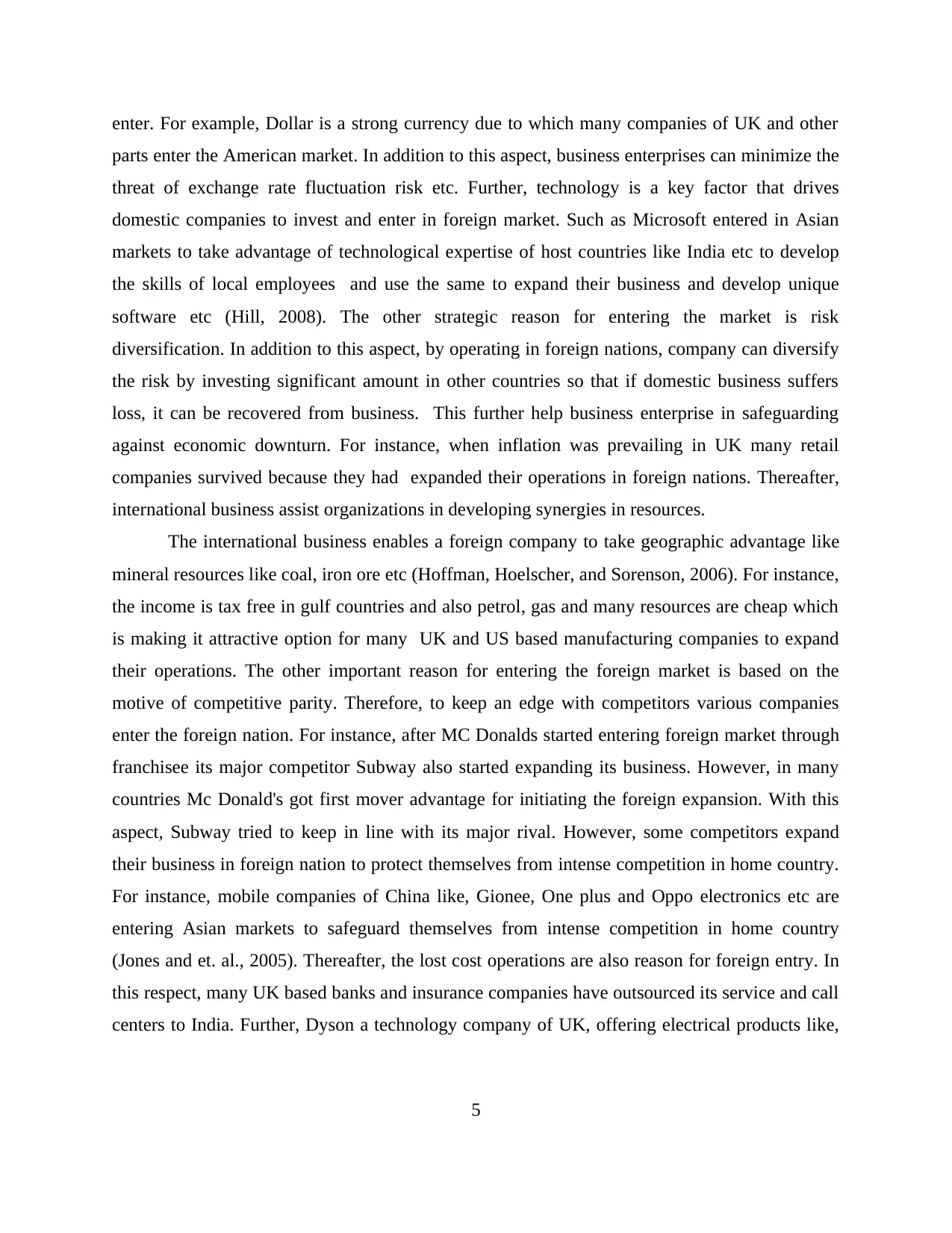
enter. For example, Dollar is a strong currency due to which many companies of UK and other
parts enter the American market. In addition to this aspect, business enterprises can minimize the
threat of exchange rate fluctuation risk etc. Further, technology is a key factor that drives
domestic companies to invest and enter in foreign market. Such as Microsoft entered in Asian
markets to take advantage of technological expertise of host countries like India etc to develop
the skills of local employees and use the same to expand their business and develop unique
software etc (Hill, 2008). The other strategic reason for entering the market is risk
diversification. In addition to this aspect, by operating in foreign nations, company can diversify
the risk by investing significant amount in other countries so that if domestic business suffers
loss, it can be recovered from business. This further help business enterprise in safeguarding
against economic downturn. For instance, when inflation was prevailing in UK many retail
companies survived because they had expanded their operations in foreign nations. Thereafter,
international business assist organizations in developing synergies in resources.
The international business enables a foreign company to take geographic advantage like
mineral resources like coal, iron ore etc (Hoffman, Hoelscher, and Sorenson, 2006). For instance,
the income is tax free in gulf countries and also petrol, gas and many resources are cheap which
is making it attractive option for many UK and US based manufacturing companies to expand
their operations. The other important reason for entering the foreign market is based on the
motive of competitive parity. Therefore, to keep an edge with competitors various companies
enter the foreign nation. For instance, after MC Donalds started entering foreign market through
franchisee its major competitor Subway also started expanding its business. However, in many
countries Mc Donald's got first mover advantage for initiating the foreign expansion. With this
aspect, Subway tried to keep in line with its major rival. However, some competitors expand
their business in foreign nation to protect themselves from intense competition in home country.
For instance, mobile companies of China like, Gionee, One plus and Oppo electronics etc are
entering Asian markets to safeguard themselves from intense competition in home country
(Jones and et. al., 2005). Thereafter, the lost cost operations are also reason for foreign entry. In
this respect, many UK based banks and insurance companies have outsourced its service and call
centers to India. Further, Dyson a technology company of UK, offering electrical products like,
5
parts enter the American market. In addition to this aspect, business enterprises can minimize the
threat of exchange rate fluctuation risk etc. Further, technology is a key factor that drives
domestic companies to invest and enter in foreign market. Such as Microsoft entered in Asian
markets to take advantage of technological expertise of host countries like India etc to develop
the skills of local employees and use the same to expand their business and develop unique
software etc (Hill, 2008). The other strategic reason for entering the market is risk
diversification. In addition to this aspect, by operating in foreign nations, company can diversify
the risk by investing significant amount in other countries so that if domestic business suffers
loss, it can be recovered from business. This further help business enterprise in safeguarding
against economic downturn. For instance, when inflation was prevailing in UK many retail
companies survived because they had expanded their operations in foreign nations. Thereafter,
international business assist organizations in developing synergies in resources.
The international business enables a foreign company to take geographic advantage like
mineral resources like coal, iron ore etc (Hoffman, Hoelscher, and Sorenson, 2006). For instance,
the income is tax free in gulf countries and also petrol, gas and many resources are cheap which
is making it attractive option for many UK and US based manufacturing companies to expand
their operations. The other important reason for entering the foreign market is based on the
motive of competitive parity. Therefore, to keep an edge with competitors various companies
enter the foreign nation. For instance, after MC Donalds started entering foreign market through
franchisee its major competitor Subway also started expanding its business. However, in many
countries Mc Donald's got first mover advantage for initiating the foreign expansion. With this
aspect, Subway tried to keep in line with its major rival. However, some competitors expand
their business in foreign nation to protect themselves from intense competition in home country.
For instance, mobile companies of China like, Gionee, One plus and Oppo electronics etc are
entering Asian markets to safeguard themselves from intense competition in home country
(Jones and et. al., 2005). Thereafter, the lost cost operations are also reason for foreign entry. In
this respect, many UK based banks and insurance companies have outsourced its service and call
centers to India. Further, Dyson a technology company of UK, offering electrical products like,
5
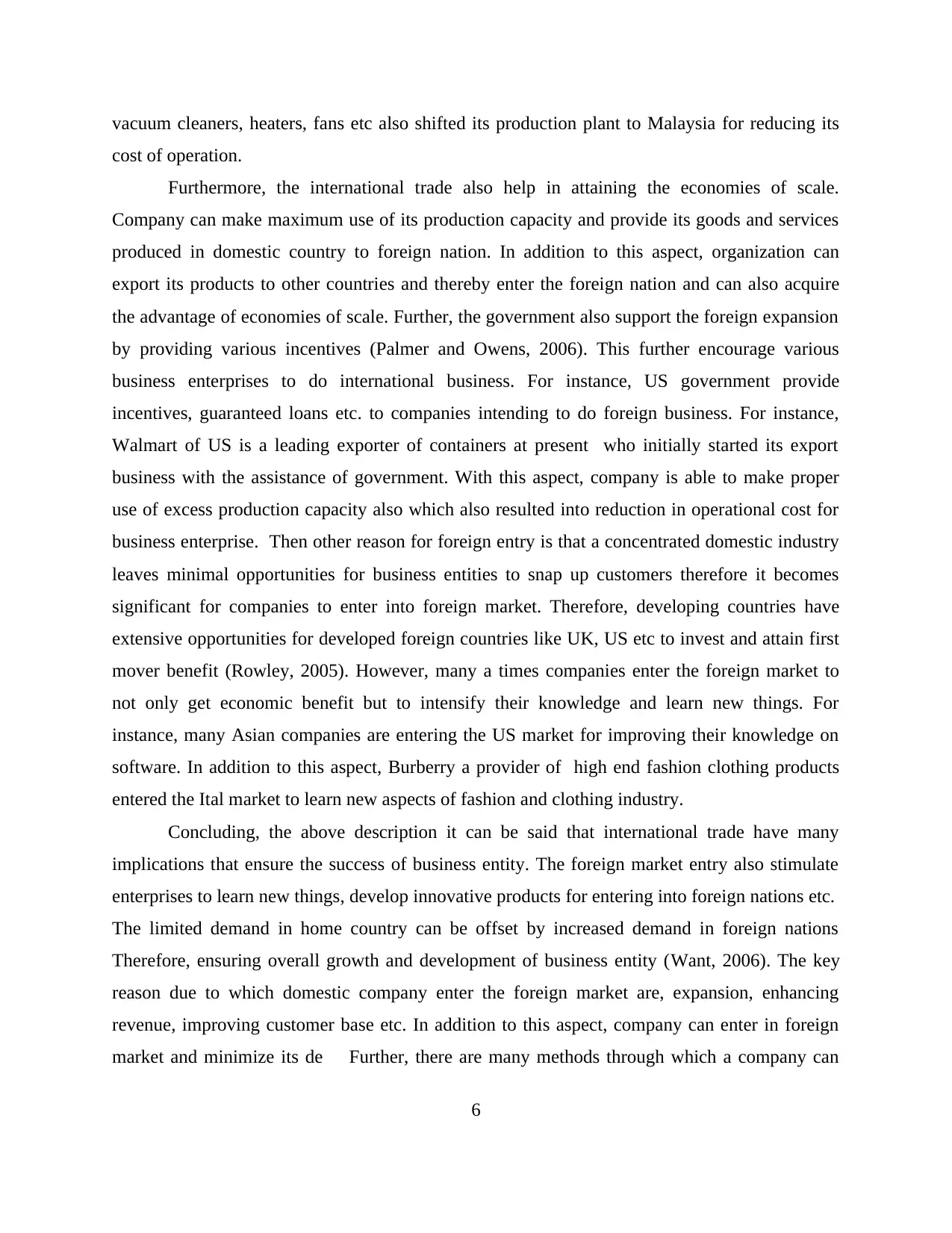
vacuum cleaners, heaters, fans etc also shifted its production plant to Malaysia for reducing its
cost of operation.
Furthermore, the international trade also help in attaining the economies of scale.
Company can make maximum use of its production capacity and provide its goods and services
produced in domestic country to foreign nation. In addition to this aspect, organization can
export its products to other countries and thereby enter the foreign nation and can also acquire
the advantage of economies of scale. Further, the government also support the foreign expansion
by providing various incentives (Palmer and Owens, 2006). This further encourage various
business enterprises to do international business. For instance, US government provide
incentives, guaranteed loans etc. to companies intending to do foreign business. For instance,
Walmart of US is a leading exporter of containers at present who initially started its export
business with the assistance of government. With this aspect, company is able to make proper
use of excess production capacity also which also resulted into reduction in operational cost for
business enterprise. Then other reason for foreign entry is that a concentrated domestic industry
leaves minimal opportunities for business entities to snap up customers therefore it becomes
significant for companies to enter into foreign market. Therefore, developing countries have
extensive opportunities for developed foreign countries like UK, US etc to invest and attain first
mover benefit (Rowley, 2005). However, many a times companies enter the foreign market to
not only get economic benefit but to intensify their knowledge and learn new things. For
instance, many Asian companies are entering the US market for improving their knowledge on
software. In addition to this aspect, Burberry a provider of high end fashion clothing products
entered the Ital market to learn new aspects of fashion and clothing industry.
Concluding, the above description it can be said that international trade have many
implications that ensure the success of business entity. The foreign market entry also stimulate
enterprises to learn new things, develop innovative products for entering into foreign nations etc.
The limited demand in home country can be offset by increased demand in foreign nations
Therefore, ensuring overall growth and development of business entity (Want, 2006). The key
reason due to which domestic company enter the foreign market are, expansion, enhancing
revenue, improving customer base etc. In addition to this aspect, company can enter in foreign
market and minimize its de Further, there are many methods through which a company can
6
cost of operation.
Furthermore, the international trade also help in attaining the economies of scale.
Company can make maximum use of its production capacity and provide its goods and services
produced in domestic country to foreign nation. In addition to this aspect, organization can
export its products to other countries and thereby enter the foreign nation and can also acquire
the advantage of economies of scale. Further, the government also support the foreign expansion
by providing various incentives (Palmer and Owens, 2006). This further encourage various
business enterprises to do international business. For instance, US government provide
incentives, guaranteed loans etc. to companies intending to do foreign business. For instance,
Walmart of US is a leading exporter of containers at present who initially started its export
business with the assistance of government. With this aspect, company is able to make proper
use of excess production capacity also which also resulted into reduction in operational cost for
business enterprise. Then other reason for foreign entry is that a concentrated domestic industry
leaves minimal opportunities for business entities to snap up customers therefore it becomes
significant for companies to enter into foreign market. Therefore, developing countries have
extensive opportunities for developed foreign countries like UK, US etc to invest and attain first
mover benefit (Rowley, 2005). However, many a times companies enter the foreign market to
not only get economic benefit but to intensify their knowledge and learn new things. For
instance, many Asian companies are entering the US market for improving their knowledge on
software. In addition to this aspect, Burberry a provider of high end fashion clothing products
entered the Ital market to learn new aspects of fashion and clothing industry.
Concluding, the above description it can be said that international trade have many
implications that ensure the success of business entity. The foreign market entry also stimulate
enterprises to learn new things, develop innovative products for entering into foreign nations etc.
The limited demand in home country can be offset by increased demand in foreign nations
Therefore, ensuring overall growth and development of business entity (Want, 2006). The key
reason due to which domestic company enter the foreign market are, expansion, enhancing
revenue, improving customer base etc. In addition to this aspect, company can enter in foreign
market and minimize its de Further, there are many methods through which a company can
6
⊘ This is a preview!⊘
Do you want full access?
Subscribe today to unlock all pages.

Trusted by 1+ million students worldwide
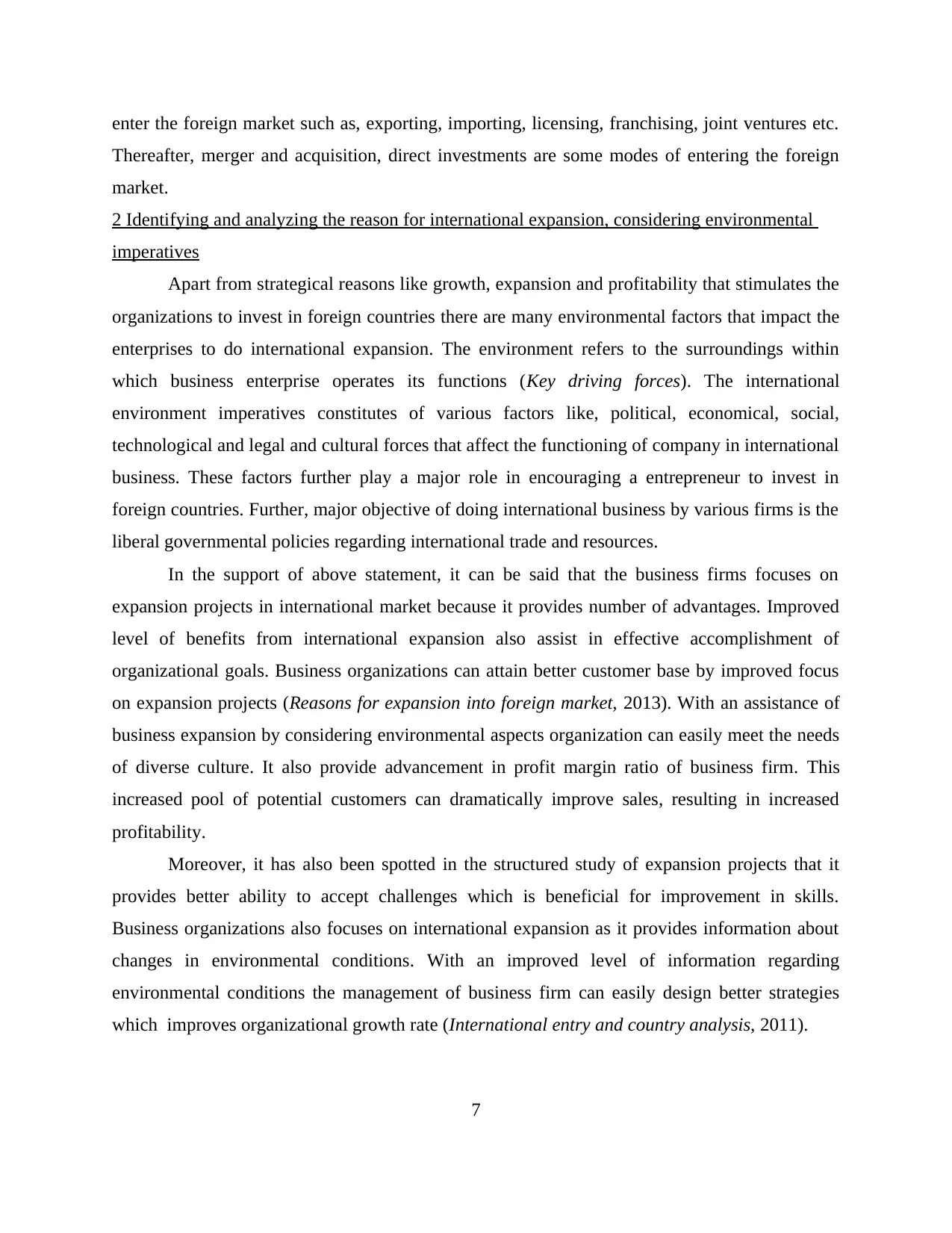
enter the foreign market such as, exporting, importing, licensing, franchising, joint ventures etc.
Thereafter, merger and acquisition, direct investments are some modes of entering the foreign
market.
2 Identifying and analyzing the reason for international expansion, considering environmental
imperatives
Apart from strategical reasons like growth, expansion and profitability that stimulates the
organizations to invest in foreign countries there are many environmental factors that impact the
enterprises to do international expansion. The environment refers to the surroundings within
which business enterprise operates its functions (Key driving forces). The international
environment imperatives constitutes of various factors like, political, economical, social,
technological and legal and cultural forces that affect the functioning of company in international
business. These factors further play a major role in encouraging a entrepreneur to invest in
foreign countries. Further, major objective of doing international business by various firms is the
liberal governmental policies regarding international trade and resources.
In the support of above statement, it can be said that the business firms focuses on
expansion projects in international market because it provides number of advantages. Improved
level of benefits from international expansion also assist in effective accomplishment of
organizational goals. Business organizations can attain better customer base by improved focus
on expansion projects (Reasons for expansion into foreign market, 2013). With an assistance of
business expansion by considering environmental aspects organization can easily meet the needs
of diverse culture. It also provide advancement in profit margin ratio of business firm. This
increased pool of potential customers can dramatically improve sales, resulting in increased
profitability.
Moreover, it has also been spotted in the structured study of expansion projects that it
provides better ability to accept challenges which is beneficial for improvement in skills.
Business organizations also focuses on international expansion as it provides information about
changes in environmental conditions. With an improved level of information regarding
environmental conditions the management of business firm can easily design better strategies
which improves organizational growth rate (International entry and country analysis, 2011).
7
Thereafter, merger and acquisition, direct investments are some modes of entering the foreign
market.
2 Identifying and analyzing the reason for international expansion, considering environmental
imperatives
Apart from strategical reasons like growth, expansion and profitability that stimulates the
organizations to invest in foreign countries there are many environmental factors that impact the
enterprises to do international expansion. The environment refers to the surroundings within
which business enterprise operates its functions (Key driving forces). The international
environment imperatives constitutes of various factors like, political, economical, social,
technological and legal and cultural forces that affect the functioning of company in international
business. These factors further play a major role in encouraging a entrepreneur to invest in
foreign countries. Further, major objective of doing international business by various firms is the
liberal governmental policies regarding international trade and resources.
In the support of above statement, it can be said that the business firms focuses on
expansion projects in international market because it provides number of advantages. Improved
level of benefits from international expansion also assist in effective accomplishment of
organizational goals. Business organizations can attain better customer base by improved focus
on expansion projects (Reasons for expansion into foreign market, 2013). With an assistance of
business expansion by considering environmental aspects organization can easily meet the needs
of diverse culture. It also provide advancement in profit margin ratio of business firm. This
increased pool of potential customers can dramatically improve sales, resulting in increased
profitability.
Moreover, it has also been spotted in the structured study of expansion projects that it
provides better ability to accept challenges which is beneficial for improvement in skills.
Business organizations also focuses on international expansion as it provides information about
changes in environmental conditions. With an improved level of information regarding
environmental conditions the management of business firm can easily design better strategies
which improves organizational growth rate (International entry and country analysis, 2011).
7
Paraphrase This Document
Need a fresh take? Get an instant paraphrase of this document with our AI Paraphraser
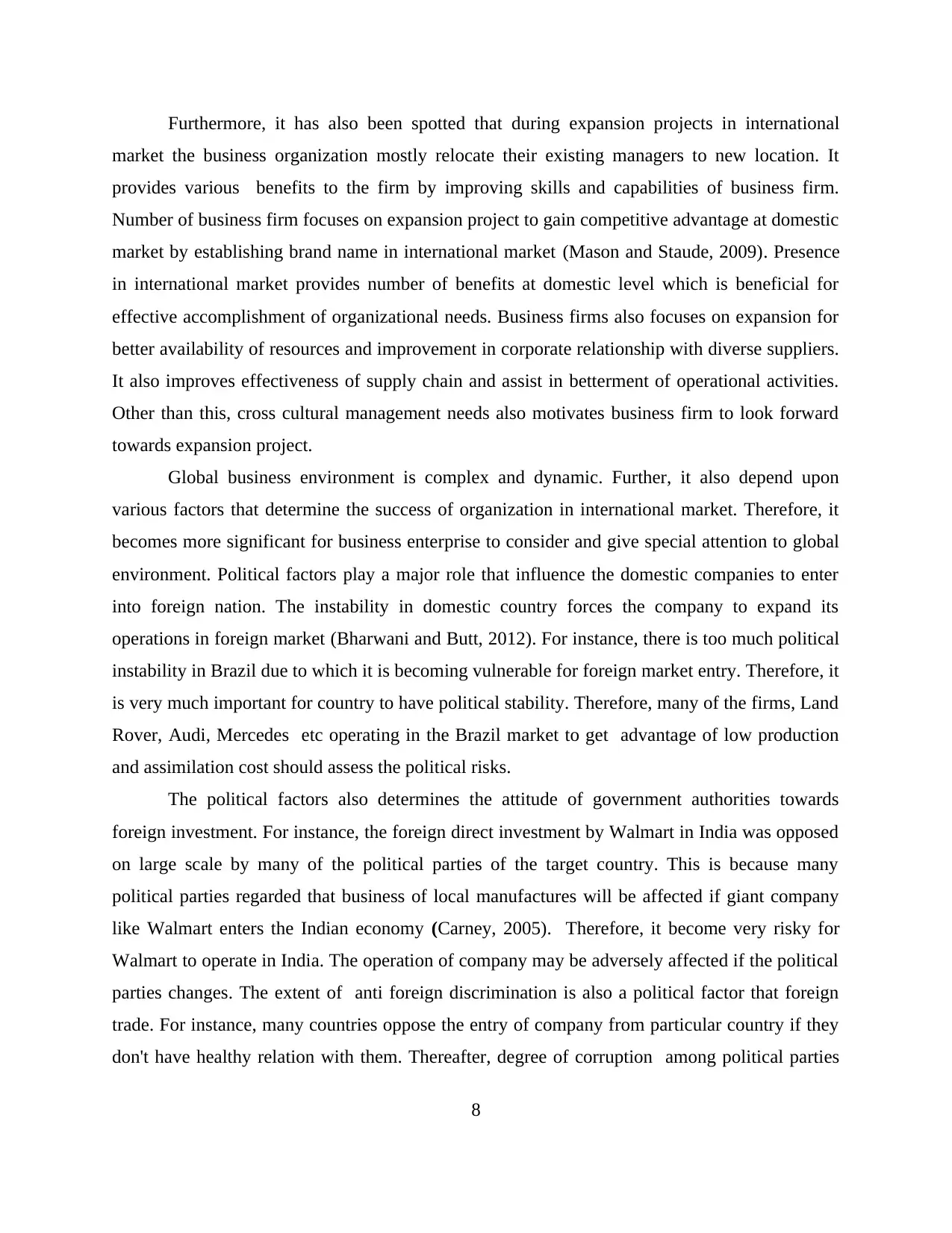
Furthermore, it has also been spotted that during expansion projects in international
market the business organization mostly relocate their existing managers to new location. It
provides various benefits to the firm by improving skills and capabilities of business firm.
Number of business firm focuses on expansion project to gain competitive advantage at domestic
market by establishing brand name in international market (Mason and Staude, 2009). Presence
in international market provides number of benefits at domestic level which is beneficial for
effective accomplishment of organizational needs. Business firms also focuses on expansion for
better availability of resources and improvement in corporate relationship with diverse suppliers.
It also improves effectiveness of supply chain and assist in betterment of operational activities.
Other than this, cross cultural management needs also motivates business firm to look forward
towards expansion project.
Global business environment is complex and dynamic. Further, it also depend upon
various factors that determine the success of organization in international market. Therefore, it
becomes more significant for business enterprise to consider and give special attention to global
environment. Political factors play a major role that influence the domestic companies to enter
into foreign nation. The instability in domestic country forces the company to expand its
operations in foreign market (Bharwani and Butt, 2012). For instance, there is too much political
instability in Brazil due to which it is becoming vulnerable for foreign market entry. Therefore, it
is very much important for country to have political stability. Therefore, many of the firms, Land
Rover, Audi, Mercedes etc operating in the Brazil market to get advantage of low production
and assimilation cost should assess the political risks.
The political factors also determines the attitude of government authorities towards
foreign investment. For instance, the foreign direct investment by Walmart in India was opposed
on large scale by many of the political parties of the target country. This is because many
political parties regarded that business of local manufactures will be affected if giant company
like Walmart enters the Indian economy (Carney, 2005). Therefore, it become very risky for
Walmart to operate in India. The operation of company may be adversely affected if the political
parties changes. The extent of anti foreign discrimination is also a political factor that foreign
trade. For instance, many countries oppose the entry of company from particular country if they
don't have healthy relation with them. Thereafter, degree of corruption among political parties
8
market the business organization mostly relocate their existing managers to new location. It
provides various benefits to the firm by improving skills and capabilities of business firm.
Number of business firm focuses on expansion project to gain competitive advantage at domestic
market by establishing brand name in international market (Mason and Staude, 2009). Presence
in international market provides number of benefits at domestic level which is beneficial for
effective accomplishment of organizational needs. Business firms also focuses on expansion for
better availability of resources and improvement in corporate relationship with diverse suppliers.
It also improves effectiveness of supply chain and assist in betterment of operational activities.
Other than this, cross cultural management needs also motivates business firm to look forward
towards expansion project.
Global business environment is complex and dynamic. Further, it also depend upon
various factors that determine the success of organization in international market. Therefore, it
becomes more significant for business enterprise to consider and give special attention to global
environment. Political factors play a major role that influence the domestic companies to enter
into foreign nation. The instability in domestic country forces the company to expand its
operations in foreign market (Bharwani and Butt, 2012). For instance, there is too much political
instability in Brazil due to which it is becoming vulnerable for foreign market entry. Therefore, it
is very much important for country to have political stability. Therefore, many of the firms, Land
Rover, Audi, Mercedes etc operating in the Brazil market to get advantage of low production
and assimilation cost should assess the political risks.
The political factors also determines the attitude of government authorities towards
foreign investment. For instance, the foreign direct investment by Walmart in India was opposed
on large scale by many of the political parties of the target country. This is because many
political parties regarded that business of local manufactures will be affected if giant company
like Walmart enters the Indian economy (Carney, 2005). Therefore, it become very risky for
Walmart to operate in India. The operation of company may be adversely affected if the political
parties changes. The extent of anti foreign discrimination is also a political factor that foreign
trade. For instance, many countries oppose the entry of company from particular country if they
don't have healthy relation with them. Thereafter, degree of corruption among political parties
8
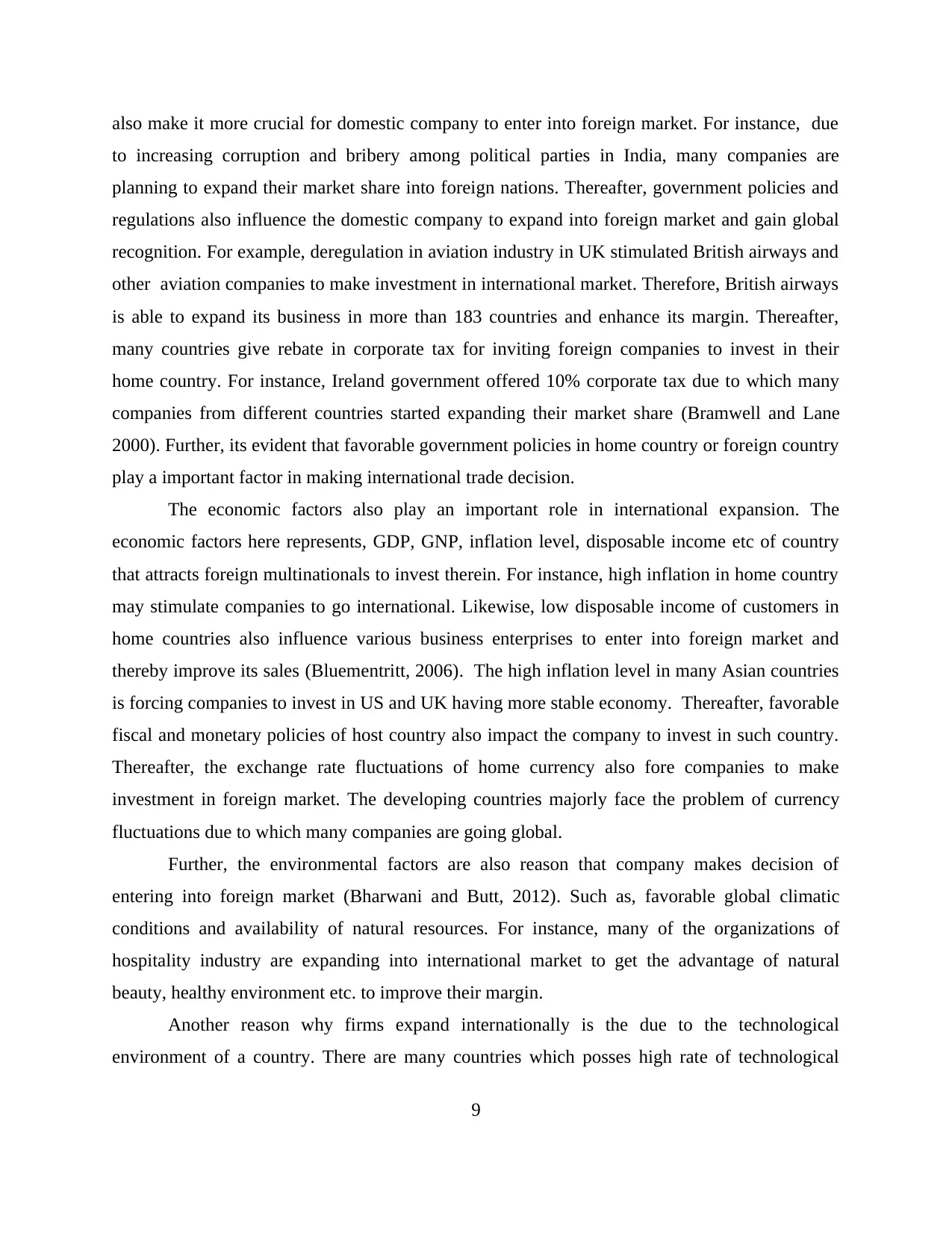
also make it more crucial for domestic company to enter into foreign market. For instance, due
to increasing corruption and bribery among political parties in India, many companies are
planning to expand their market share into foreign nations. Thereafter, government policies and
regulations also influence the domestic company to expand into foreign market and gain global
recognition. For example, deregulation in aviation industry in UK stimulated British airways and
other aviation companies to make investment in international market. Therefore, British airways
is able to expand its business in more than 183 countries and enhance its margin. Thereafter,
many countries give rebate in corporate tax for inviting foreign companies to invest in their
home country. For instance, Ireland government offered 10% corporate tax due to which many
companies from different countries started expanding their market share (Bramwell and Lane
2000). Further, its evident that favorable government policies in home country or foreign country
play a important factor in making international trade decision.
The economic factors also play an important role in international expansion. The
economic factors here represents, GDP, GNP, inflation level, disposable income etc of country
that attracts foreign multinationals to invest therein. For instance, high inflation in home country
may stimulate companies to go international. Likewise, low disposable income of customers in
home countries also influence various business enterprises to enter into foreign market and
thereby improve its sales (Bluementritt, 2006). The high inflation level in many Asian countries
is forcing companies to invest in US and UK having more stable economy. Thereafter, favorable
fiscal and monetary policies of host country also impact the company to invest in such country.
Thereafter, the exchange rate fluctuations of home currency also fore companies to make
investment in foreign market. The developing countries majorly face the problem of currency
fluctuations due to which many companies are going global.
Further, the environmental factors are also reason that company makes decision of
entering into foreign market (Bharwani and Butt, 2012). Such as, favorable global climatic
conditions and availability of natural resources. For instance, many of the organizations of
hospitality industry are expanding into international market to get the advantage of natural
beauty, healthy environment etc. to improve their margin.
Another reason why firms expand internationally is the due to the technological
environment of a country. There are many countries which posses high rate of technological
9
to increasing corruption and bribery among political parties in India, many companies are
planning to expand their market share into foreign nations. Thereafter, government policies and
regulations also influence the domestic company to expand into foreign market and gain global
recognition. For example, deregulation in aviation industry in UK stimulated British airways and
other aviation companies to make investment in international market. Therefore, British airways
is able to expand its business in more than 183 countries and enhance its margin. Thereafter,
many countries give rebate in corporate tax for inviting foreign companies to invest in their
home country. For instance, Ireland government offered 10% corporate tax due to which many
companies from different countries started expanding their market share (Bramwell and Lane
2000). Further, its evident that favorable government policies in home country or foreign country
play a important factor in making international trade decision.
The economic factors also play an important role in international expansion. The
economic factors here represents, GDP, GNP, inflation level, disposable income etc of country
that attracts foreign multinationals to invest therein. For instance, high inflation in home country
may stimulate companies to go international. Likewise, low disposable income of customers in
home countries also influence various business enterprises to enter into foreign market and
thereby improve its sales (Bluementritt, 2006). The high inflation level in many Asian countries
is forcing companies to invest in US and UK having more stable economy. Thereafter, favorable
fiscal and monetary policies of host country also impact the company to invest in such country.
Thereafter, the exchange rate fluctuations of home currency also fore companies to make
investment in foreign market. The developing countries majorly face the problem of currency
fluctuations due to which many companies are going global.
Further, the environmental factors are also reason that company makes decision of
entering into foreign market (Bharwani and Butt, 2012). Such as, favorable global climatic
conditions and availability of natural resources. For instance, many of the organizations of
hospitality industry are expanding into international market to get the advantage of natural
beauty, healthy environment etc. to improve their margin.
Another reason why firms expand internationally is the due to the technological
environment of a country. There are many countries which posses high rate of technological
9
⊘ This is a preview!⊘
Do you want full access?
Subscribe today to unlock all pages.

Trusted by 1+ million students worldwide
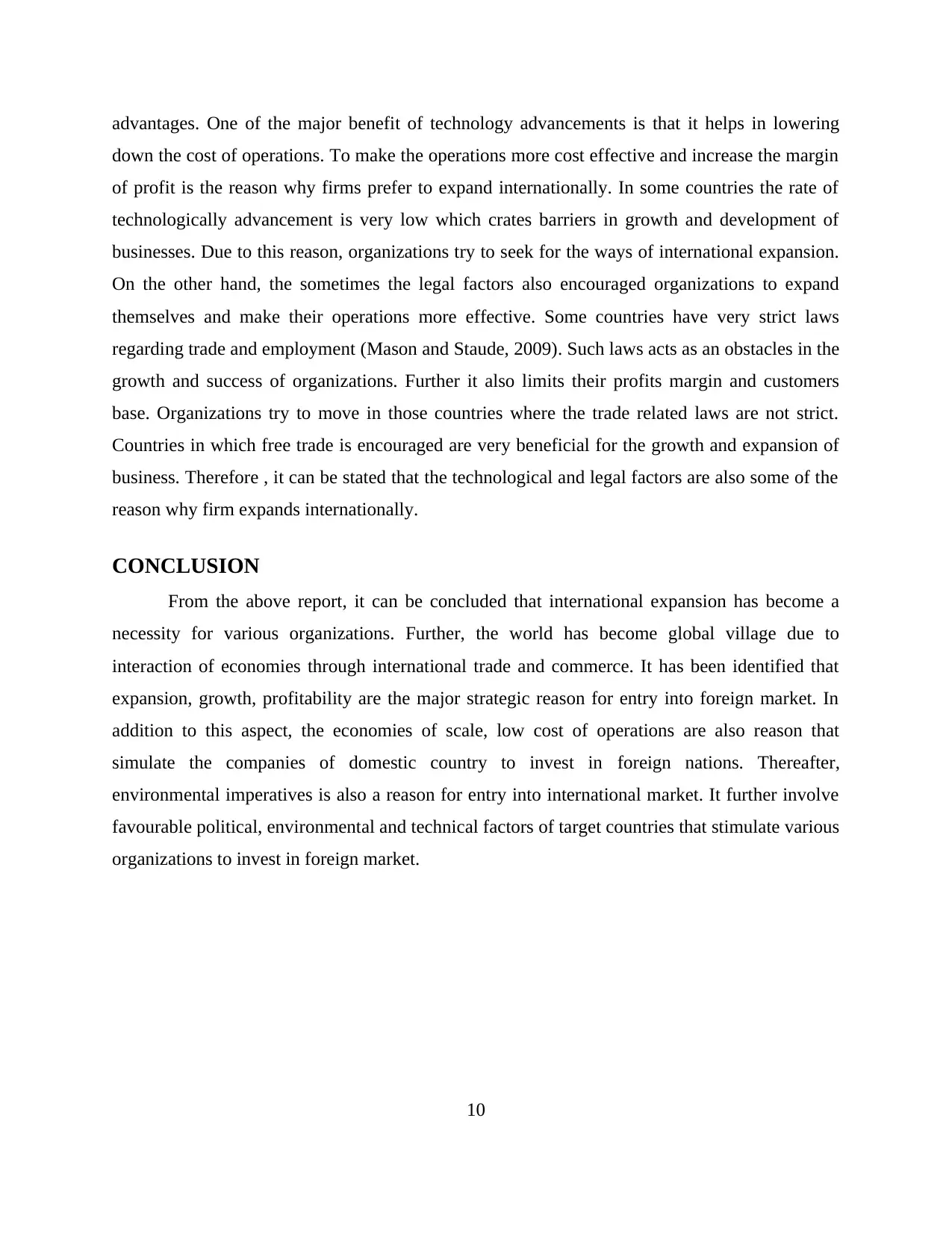
advantages. One of the major benefit of technology advancements is that it helps in lowering
down the cost of operations. To make the operations more cost effective and increase the margin
of profit is the reason why firms prefer to expand internationally. In some countries the rate of
technologically advancement is very low which crates barriers in growth and development of
businesses. Due to this reason, organizations try to seek for the ways of international expansion.
On the other hand, the sometimes the legal factors also encouraged organizations to expand
themselves and make their operations more effective. Some countries have very strict laws
regarding trade and employment (Mason and Staude, 2009). Such laws acts as an obstacles in the
growth and success of organizations. Further it also limits their profits margin and customers
base. Organizations try to move in those countries where the trade related laws are not strict.
Countries in which free trade is encouraged are very beneficial for the growth and expansion of
business. Therefore , it can be stated that the technological and legal factors are also some of the
reason why firm expands internationally.
CONCLUSION
From the above report, it can be concluded that international expansion has become a
necessity for various organizations. Further, the world has become global village due to
interaction of economies through international trade and commerce. It has been identified that
expansion, growth, profitability are the major strategic reason for entry into foreign market. In
addition to this aspect, the economies of scale, low cost of operations are also reason that
simulate the companies of domestic country to invest in foreign nations. Thereafter,
environmental imperatives is also a reason for entry into international market. It further involve
favourable political, environmental and technical factors of target countries that stimulate various
organizations to invest in foreign market.
10
down the cost of operations. To make the operations more cost effective and increase the margin
of profit is the reason why firms prefer to expand internationally. In some countries the rate of
technologically advancement is very low which crates barriers in growth and development of
businesses. Due to this reason, organizations try to seek for the ways of international expansion.
On the other hand, the sometimes the legal factors also encouraged organizations to expand
themselves and make their operations more effective. Some countries have very strict laws
regarding trade and employment (Mason and Staude, 2009). Such laws acts as an obstacles in the
growth and success of organizations. Further it also limits their profits margin and customers
base. Organizations try to move in those countries where the trade related laws are not strict.
Countries in which free trade is encouraged are very beneficial for the growth and expansion of
business. Therefore , it can be stated that the technological and legal factors are also some of the
reason why firm expands internationally.
CONCLUSION
From the above report, it can be concluded that international expansion has become a
necessity for various organizations. Further, the world has become global village due to
interaction of economies through international trade and commerce. It has been identified that
expansion, growth, profitability are the major strategic reason for entry into foreign market. In
addition to this aspect, the economies of scale, low cost of operations are also reason that
simulate the companies of domestic country to invest in foreign nations. Thereafter,
environmental imperatives is also a reason for entry into international market. It further involve
favourable political, environmental and technical factors of target countries that stimulate various
organizations to invest in foreign market.
10
Paraphrase This Document
Need a fresh take? Get an instant paraphrase of this document with our AI Paraphraser
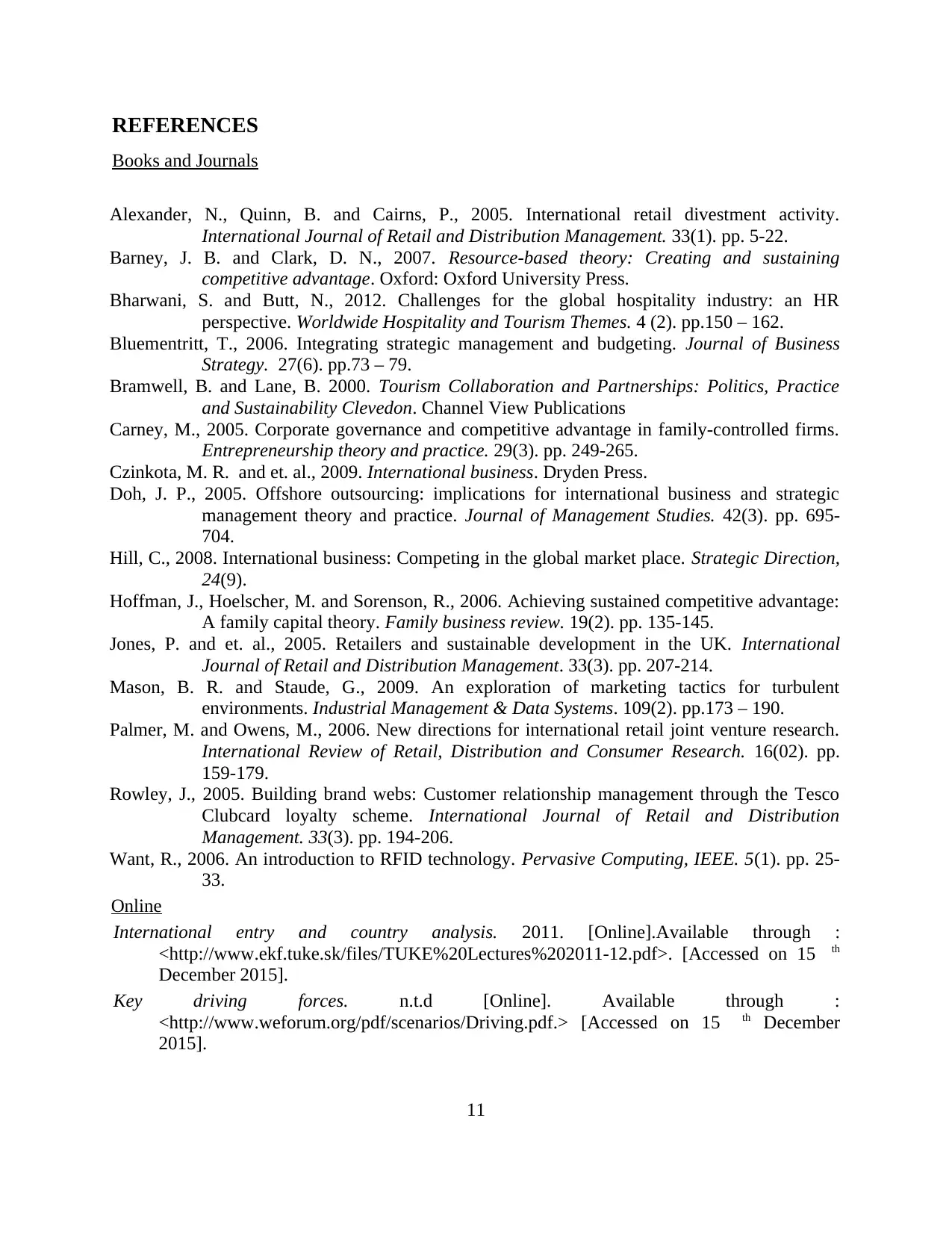
REFERENCES
Books and Journals
Alexander, N., Quinn, B. and Cairns, P., 2005. International retail divestment activity.
International Journal of Retail and Distribution Management. 33(1). pp. 5-22.
Barney, J. B. and Clark, D. N., 2007. Resource-based theory: Creating and sustaining
competitive advantage. Oxford: Oxford University Press.
Bharwani, S. and Butt, N., 2012. Challenges for the global hospitality industry: an HR
perspective. Worldwide Hospitality and Tourism Themes. 4 (2). pp.150 – 162.
Bluementritt, T., 2006. Integrating strategic management and budgeting. Journal of Business
Strategy. 27(6). pp.73 – 79.
Bramwell, B. and Lane, B. 2000. Tourism Collaboration and Partnerships: Politics, Practice
and Sustainability Clevedon. Channel View Publications
Carney, M., 2005. Corporate governance and competitive advantage in family‐controlled firms.
Entrepreneurship theory and practice. 29(3). pp. 249-265.
Czinkota, M. R. and et. al., 2009. International business. Dryden Press.
Doh, J. P., 2005. Offshore outsourcing: implications for international business and strategic
management theory and practice. Journal of Management Studies. 42(3). pp. 695-
704.
Hill, C., 2008. International business: Competing in the global market place. Strategic Direction,
24(9).
Hoffman, J., Hoelscher, M. and Sorenson, R., 2006. Achieving sustained competitive advantage:
A family capital theory. Family business review. 19(2). pp. 135-145.
Jones, P. and et. al., 2005. Retailers and sustainable development in the UK. International
Journal of Retail and Distribution Management. 33(3). pp. 207-214.
Mason, B. R. and Staude, G., 2009. An exploration of marketing tactics for turbulent
environments. Industrial Management & Data Systems. 109(2). pp.173 – 190.
Palmer, M. and Owens, M., 2006. New directions for international retail joint venture research.
International Review of Retail, Distribution and Consumer Research. 16(02). pp.
159-179.
Rowley, J., 2005. Building brand webs: Customer relationship management through the Tesco
Clubcard loyalty scheme. International Journal of Retail and Distribution
Management. 33(3). pp. 194-206.
Want, R., 2006. An introduction to RFID technology. Pervasive Computing, IEEE. 5(1). pp. 25-
33.
Online
International entry and country analysis. 2011. [Online].Available through :
<http://www.ekf.tuke.sk/files/TUKE%20Lectures%202011-12.pdf>. [Accessed on 15 th
December 2015].
Key driving forces. n.t.d [Online]. Available through :
<http://www.weforum.org/pdf/scenarios/Driving.pdf.> [Accessed on 15 th December
2015].
11
Books and Journals
Alexander, N., Quinn, B. and Cairns, P., 2005. International retail divestment activity.
International Journal of Retail and Distribution Management. 33(1). pp. 5-22.
Barney, J. B. and Clark, D. N., 2007. Resource-based theory: Creating and sustaining
competitive advantage. Oxford: Oxford University Press.
Bharwani, S. and Butt, N., 2012. Challenges for the global hospitality industry: an HR
perspective. Worldwide Hospitality and Tourism Themes. 4 (2). pp.150 – 162.
Bluementritt, T., 2006. Integrating strategic management and budgeting. Journal of Business
Strategy. 27(6). pp.73 – 79.
Bramwell, B. and Lane, B. 2000. Tourism Collaboration and Partnerships: Politics, Practice
and Sustainability Clevedon. Channel View Publications
Carney, M., 2005. Corporate governance and competitive advantage in family‐controlled firms.
Entrepreneurship theory and practice. 29(3). pp. 249-265.
Czinkota, M. R. and et. al., 2009. International business. Dryden Press.
Doh, J. P., 2005. Offshore outsourcing: implications for international business and strategic
management theory and practice. Journal of Management Studies. 42(3). pp. 695-
704.
Hill, C., 2008. International business: Competing in the global market place. Strategic Direction,
24(9).
Hoffman, J., Hoelscher, M. and Sorenson, R., 2006. Achieving sustained competitive advantage:
A family capital theory. Family business review. 19(2). pp. 135-145.
Jones, P. and et. al., 2005. Retailers and sustainable development in the UK. International
Journal of Retail and Distribution Management. 33(3). pp. 207-214.
Mason, B. R. and Staude, G., 2009. An exploration of marketing tactics for turbulent
environments. Industrial Management & Data Systems. 109(2). pp.173 – 190.
Palmer, M. and Owens, M., 2006. New directions for international retail joint venture research.
International Review of Retail, Distribution and Consumer Research. 16(02). pp.
159-179.
Rowley, J., 2005. Building brand webs: Customer relationship management through the Tesco
Clubcard loyalty scheme. International Journal of Retail and Distribution
Management. 33(3). pp. 194-206.
Want, R., 2006. An introduction to RFID technology. Pervasive Computing, IEEE. 5(1). pp. 25-
33.
Online
International entry and country analysis. 2011. [Online].Available through :
<http://www.ekf.tuke.sk/files/TUKE%20Lectures%202011-12.pdf>. [Accessed on 15 th
December 2015].
Key driving forces. n.t.d [Online]. Available through :
<http://www.weforum.org/pdf/scenarios/Driving.pdf.> [Accessed on 15 th December
2015].
11

Reasons for expansion into foreign market. 2013. [Online].Available through :
<http://www.toknowpress.net/ISBN/978-961-6914-02-4/papers/ML13-349.pdf>.
[Accessed on 15 th December 2015].
12
<http://www.toknowpress.net/ISBN/978-961-6914-02-4/papers/ML13-349.pdf>.
[Accessed on 15 th December 2015].
12
⊘ This is a preview!⊘
Do you want full access?
Subscribe today to unlock all pages.

Trusted by 1+ million students worldwide
1 out of 12
Related Documents
Your All-in-One AI-Powered Toolkit for Academic Success.
+13062052269
info@desklib.com
Available 24*7 on WhatsApp / Email
![[object Object]](/_next/static/media/star-bottom.7253800d.svg)
Unlock your academic potential
Copyright © 2020–2026 A2Z Services. All Rights Reserved. Developed and managed by ZUCOL.




